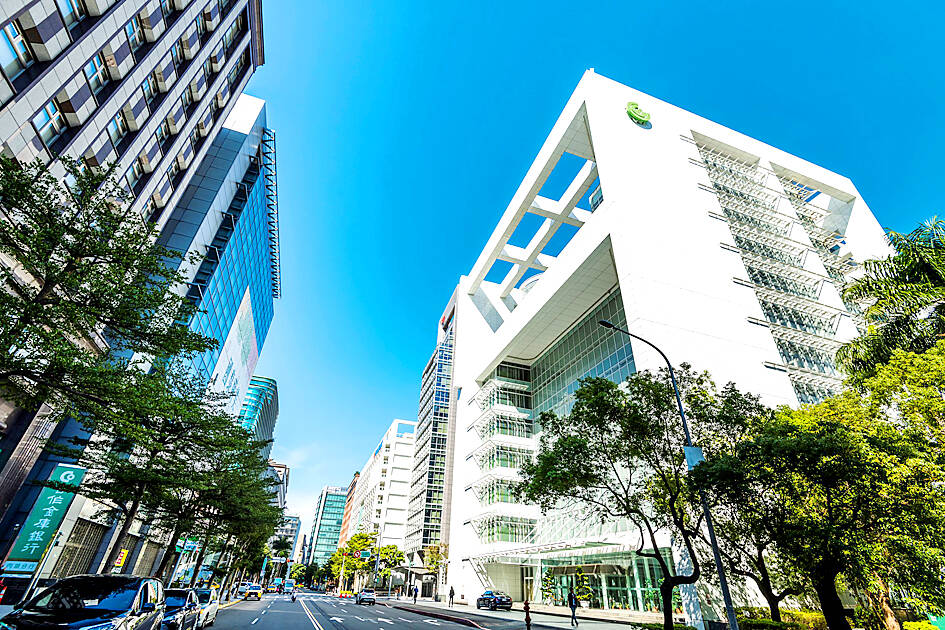Commercial property transactions last quarter more than doubled to NT$56.7 billion (US$1.78 billion) from three months earlier, driven by strong demand from local tech firms to expand their capacity, data released by property consultancy Savills Taiwan (第一太平戴維斯) on Tuesday showed.
Sales surged 176 percent from the same period last year.
Most of the commercial real-estate deals took place in southern Taiwan, with available properties becoming increasingly scarce in the north, Savills Taiwan said.

Photo courtesy of Sinyi Global Management Co
“Technology firms became the largest commercial property buyers by pouring NT$39.9 billion into existing factories, accounting for 70 percent of the deals during the July-to-September period,” Savills research manager Erin Ting (丁玟甄) said.
Taiwan Semiconductor Manufacturing Co (台積電), the world’s largest advanced chipmaker, bought an idle plant in Tainan from flat-panel display maker Innolux Corp (群創) for NT$17.14 billion, as it is increasing its advanced-chip packaging capacity, Ting said.
Micron Technology Taiwan Inc (台灣美光), the local subsidiary of a US producer of computer memory and computer data storage, acquired an industrial property in Tainan from flat-panel supplier AUO Corp (友達) for NT$7.4 billion, she said.
Chip tester and packager ASE Technology Holding Co (日月光投控) bought two industrial complexes in Kaohsiung for NT$5.26 billion to meet expansion needs, she said.
All three firms have benefitted from business improvement linked to an artificial intelligence boom and intend to add capacity by acquiring existing factories, Ting said.
In the first three quarters of the year, commercial property transactions totaled NT$124.9 billion, rising 33 percent from a year earlier, Savills data showed.
Tech firms contributed NT$56.6 billion, or 47 percent, followed by developers and builders at NT$26.3 billion and investment institutions at NT$9.9 billion, it said.
Developers and builders have targeted old hotels, office buildings and factories in major urban areas since urban renewal projects and reconstruction of dilapidated buildings are not subject to the central bank’s loan restrictions, Savills Taiwan said.
By contrast, life insurance companies, traditionally the main players in the commercial property market, stayed low-key in the first nine months of this year.
Ting attributed it to the required minimum investment return of 2.97 percent for life insurers following waves of interest rate hikes.
Soaring property prices in recent years have added to their difficulty, especially in northern Taiwan and special municipalities, Ting said.
Instead, life insurers have sought to use their investment funds for public development projects, Savills Taiwan said.
Taiwan Life Insurance Co (台灣人壽) late last month won a contract to develop a 57,000 ping (188,430m2) plot of land in Taoyuan for NT$13.7 billion, aiming to build hotels, shopping spaces and a mixed-use stadium, it said.

SELL-OFF: Investors expect tariff-driven volatility as the local boarse reopens today, while analysts say government support and solid fundamentals would steady sentiment Local investors are bracing for a sharp market downturn today as the nation’s financial markets resume trading following a two-day closure for national holidays before the weekend, with sentiment rattled by US President Donald Trump’s sweeping tariff announcement. Trump’s unveiling of new “reciprocal tariffs” on Wednesday triggered a sell-off in global markets, with the FTSE Taiwan Index Futures — a benchmark for Taiwanese equities traded in Singapore — tumbling 9.2 percent over the past two sessions. Meanwhile, the American depositary receipts (ADRs) of Taiwan Semiconductor Manufacturing Co (TSMC, 台積電), the most heavily weighted stock on the TAIEX, plunged 13.8 percent in

A wave of stop-loss selling and panic selling hit Taiwan's stock market at its opening today, with the weighted index plunging 2,086 points — a drop of more than 9.7 percent — marking the largest intraday point and percentage loss on record. The index bottomed out at 19,212.02, while futures were locked limit-down, with more than 1,000 stocks hitting their daily drop limit. Three heavyweight stocks — Taiwan Semiconductor Manufacturing Co (TSMC, 台積電), Hon Hai Precision Industry Co (Foxconn, 鴻海精密) and MediaTek (聯發科) — hit their limit-down prices as soon as the market opened, falling to NT$848 (US$25.54), NT$138.5 and NT$1,295 respectively. TSMC's

ASML Holding NV, the sole producer of the most advanced machines used in semiconductor manufacturing, said geopolitical tensions are harming innovation a day after US President Donald Trump levied massive tariffs that promise to disrupt trade flows across the entire world. “Our industry has been built basically on the ability of people to work together, to innovate together,” ASML chief executive officer Christophe Fouquet said in a recorded message at a Thursday industry event in the Netherlands. Export controls and increasing geopolitical tensions challenge that collaboration, he said, without specifically addressing the new US tariffs. Tech executives in the EU, which is

In a small town in Paraguay, a showdown is brewing between traditional producers of yerba mate, a bitter herbal tea popular across South America, and miners of a shinier treasure: gold. A rush for the precious metal is pitting mate growers and indigenous groups against the expanding operations of small-scale miners who, until recently, were their neighbors, not nemeses. “They [the miners] have destroyed everything... The canals, springs, swamps,” said Vidal Britez, president of the Yerba Mate Producers’ Association of the town of Paso Yobai, about 210km east of capital Asuncion. “You can see the pollution from the dead fish.